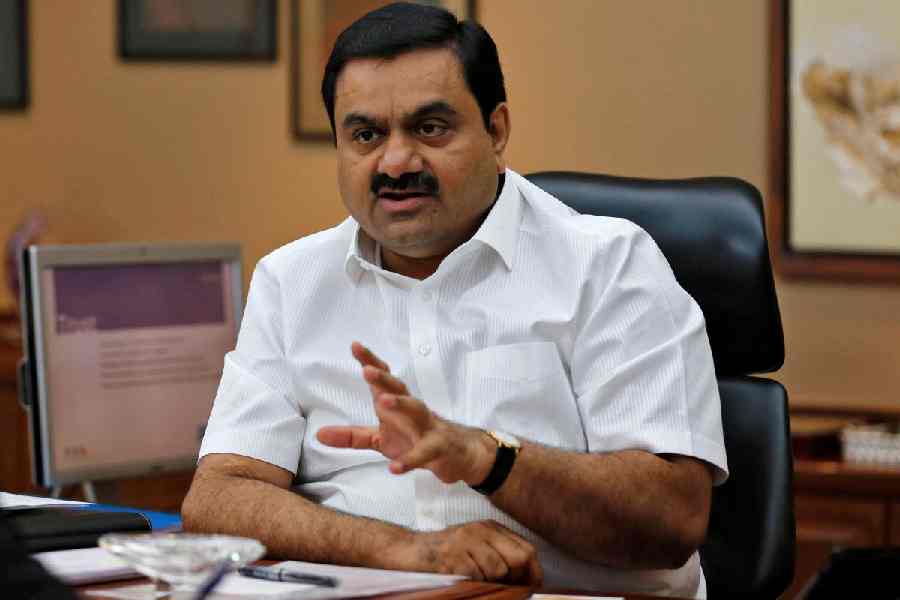Pressure has started to mount on market watchdog Sebi to come out with a final report on the status of its 18-month-long investigation into the slew of accusations that US short-seller Hindenburg Research had levelled against the Adani group in its damning report released in January last year.
On Tuesday, Vishal Tiwari — an advocate who has relentlessly pursued a public interest litigation to fix the blame for the rot within the system that enabled a cabal of unscrupulous players to manipulate the stock markets by round-tripping funds through an intricate web of entities based in overseas tax havens — filed an application before the Supreme Court urging it to direct the market watchdog to submit a conclusive report on its investigation into l’affaire Adani.
When the first batch of petitions into the Adani case came up on February 17 last year, the Supreme Court had directed Sebi to “conclude its investigation within two months and file a status report before this court”.
The Hindenburg report had raised 88 specific questions. The market regulator determined that only 24 charges had some substance and were worthy of investigation.
In August last year, the regulator informed the apex court that it had been able to conclude its investigation into 22 of the 24 charges but did not say whether the charges were proven or not.
In January this year, the apex court directed Sebi “to complete the two pending investigations expeditiously, preferably within three months”.
The deadline has long since passed and the market regulator hasn’t come up with a final report, which prompted Tiwari to move the court once again.
But there was considerable drama over Tiwari’s latest application as the apex court’s registry refused to list it for hearing on the ground that no case had been made out.
The registry tried to stymie the petition by quibbling over the wording of the January order handed down by Chief Justice of India D.Y. Chandrachud and Justices J.B. Pardiwala and Manoj Misra. The registry tried to argue that by using the word “preferably”, the apex court had not actually fixed a timeline.
Tiwari then approached the court to challenge the registry’s stand on his petition.
He submitted that by using the word “preferably”, it could not be understood that no timeline was fixed.
He argued that the order specifically mentions “three months”, and this is sufficient to construe that a fixed time period has been laid down for the completion of the pending investigations.
Tiwari’s petition assumes importance in the light of the latest revelations by Hindenburg Research, which has claimed that it possessed some whistleblower documents that established a nexus between Sebi chairperson Madhabi Puri-Buch and her husband Dhaval and the Adani group.
The latest Hindenburg report claims that Puri-Buch had invested money in a small Mauritius-based offshore fund called IPE Fund Plus in June 2015, which had also been used by two Bermuda-based funds controlled by Vinod Adani to funnel money into the Indian stock markets.
Puri-Buch has already denied any links with the Adanis and has argued that the investment had been made when both she and her husband were private citizens based out of Singapore.
The Sebi chief said that before she joined the regulator as a whole-time director in April 2017, the couple decided that Dhaval would be the sole person authorised to operate the account.
She said that the investment had been made because chief investment officer (CIO) at the fund at that time — Anil Ahuja — was a childhood friend of Dhaval. When Ahuja left the fund in 2018, the couple had pressed for the redemption of their investment. Tiwari had earlier approached the apex court seeking a transfer of the case from Sebi to some other federal investigator on the ground that the regulator had “willfully delayed the submission of its status report on the investigation into the Adani group within the time granted by the court”.
In his latest petition, Tiwari said the public and the investors had “the right to know about the investigations led by Sebi and its conclusions are essential for the benefit of investors”.
After the brouhaha over Hindenburg latest revelations against Puri-Buch, Sebi had said that it had concluded its investigation into one more charge against the Adani group in March — which means one issue still remains and its final report is some way off.










